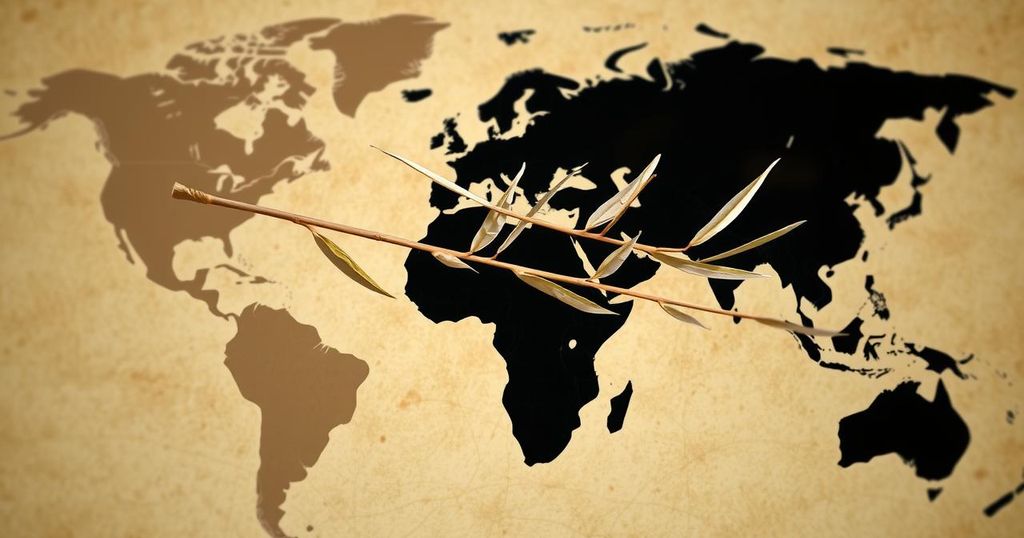Iran’s Foreign Minister proposed relocating Israelis to Greenland as a response to ongoing conflicts in Gaza, countering Trump’s plan to resettle Palestinians. His suggestion reflects the contentious relationship between Iran and the U.S. amidst complex geopolitical dynamics. The idea has received significant criticism, underscoring regional tensions and human rights issues.
Iran’s Foreign Minister Abbas Araghchi has proposed relocating Israelis to Greenland as a proposed solution to the ongoing tension in Gaza. In an exclusive interview with Sky News, he mentioned wanting to address both the Gaza conflict and Trump’s controversial plans to relocate Palestinians. This suggestion appears as a response to the intense friction between Iran and the United States regarding Israeli actions and U.S. foreign policy in the region.
The discussion follows U.S. President Donald Trump’s recent suggestions to “clean out” Gaza by resettling Palestinians in neighboring countries, receiving significant pushback from Arab nations. Araghchi’s comments could exacerbate existing tensions between Iran and the U.S., particularly as President Trump had previously expressed a desire to purchase Greenland. This outlandish proposal runs parallel to Trump’s more serious discussions about resettling Palestinian populations.
During the interview, Araghchi noted that previous attempts to alter the situation in Palestine have failed, asserting that “Palestinians cannot be expelled.” He suggested, in a somewhat sarcastic tone, that rather than relocating Palestinians, a more viable solution would be to move Israelis to Greenland, allowing both the issue in Gaza and the situation in Greenland to be addressed simultaneously.
These comments emerged amid escalating tensions regarding Iran’s nuclear program and perceived Israeli threats. President Trump described Gaza as a “demolition site” and sought to address what he believes to be a population crisis by resettling a significant number of Palestinians.
The backlash from his plans was immediate, with both Jordan and Egypt rejecting the president’s ideas. Additionally, Trump’s prior attempts to acquire Greenland were met with disapproval from Denmark’s Prime Minister, further complicating international relations surrounding this issue.
Notable reactions to Araghchi’s inflammatory proposal have appeared on social media. Journalist Hala Jaber remarked on the irony of considering such a suggestion in contrast to Trump’s plans for Palestinians. Historical and cultural commentators have also expressed their disdain for the notion of ethnic cleansing implied in such remarks.
Despite a recent ceasefire between Israel and Hamas, the situation in the region remains volatile. While Araghchi’s remarks might reflect Iran’s stance, they also indicate the complex geopolitical dynamics at play in the Middle East and the United States’ role in them.
The tension between Israel and Hamas has been a longstanding issue, further complicated by U.S. foreign policy. Recent comments made by U.S. officials, including President Trump, advocating for the resettlement of Palestinians in neighboring countries have drawn criticism from various quarters, including Arab nations. The Iranian government has consistently opposed any attempts to displace Palestinians and has responded to these proposals with its own provocative suggestions, reflecting broader regional tensions and ideological divisions.
The discourse surrounding the Israeli-Palestinian conflict continues to provoke extreme proposals and responses. Araghchi’s suggestion to relocate Israelis to Greenland serves as a provocative counterpoint to Trump’s relocation of Palestinians, highlighting the complexities and sensitivities involved in addressing Middle Eastern geopolitics. As tensions persist, the international community remains divided, grappling with similar issues of displacement and human rights within the region.
Original Source: www.newsweek.com




